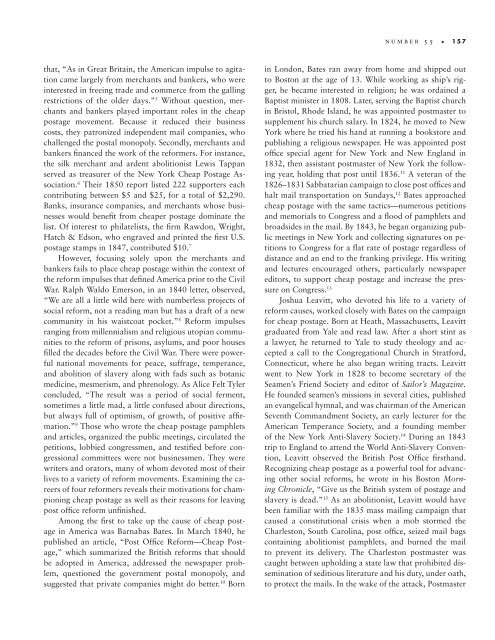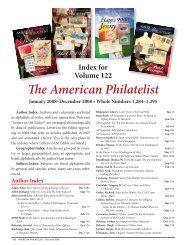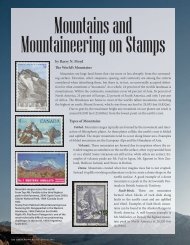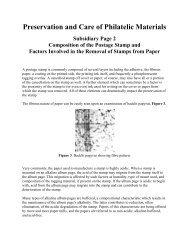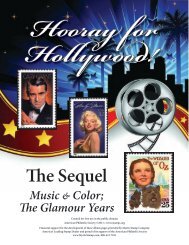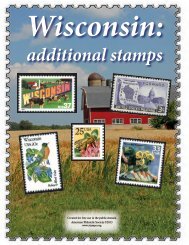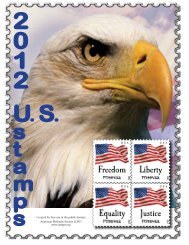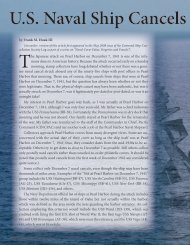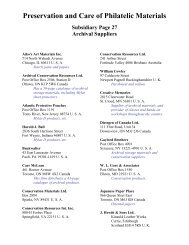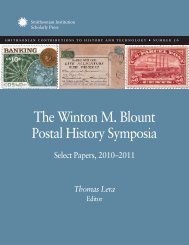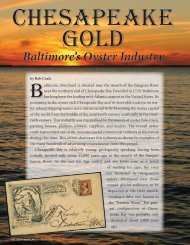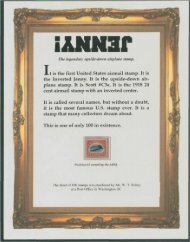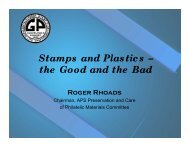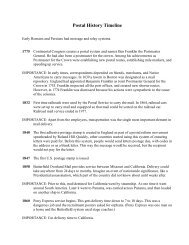The Winton M. Blount Postal History Symposia - Smithsonian ...
The Winton M. Blount Postal History Symposia - Smithsonian ...
The Winton M. Blount Postal History Symposia - Smithsonian ...
- No tags were found...
Create successful ePaper yourself
Turn your PDF publications into a flip-book with our unique Google optimized e-Paper software.
n u m b e r 5 5 • 1 5 7that, “As in Great Britain, the American impulse to agitationcame largely from merchants and bankers, who wereinterested in freeing trade and commerce from the gallingrestrictions of the older days.” 5 Without question, merchantsand bankers played important roles in the cheappostage movement. Because it reduced their businesscosts, they patronized independent mail companies, whochallenged the postal monopoly. Secondly, merchants andbankers financed the work of the reformers. For instance,the silk merchant and ardent abolitionist Lewis Tappanserved as treasurer of the New York Cheap Postage Association.6 <strong>The</strong>ir 1850 report listed 222 supporters eachcontributing between $5 and $25, for a total of $2,290.Banks, insurance companies, and merchants whose businesseswould benefit from cheaper postage dominate thelist. Of interest to philatelists, the firm Rawdon, Wright,Hatch & Edson, who engraved and printed the first U.S.postage stamps in 1847, contributed $10. 7However, focusing solely upon the merchants andbankers fails to place cheap postage within the context ofthe reform impulses that defined America prior to the CivilWar. Ralph Waldo Emerson, in an 1840 letter, observed,“We are all a little wild here with numberless projects ofsocial reform, not a reading man but has a draft of a newcommunity in his waistcoat pocket.” 8 Reform impulsesranging from millennialism and religious utopian communitiesto the reform of prisons, asylums, and poor housesfilled the decades before the Civil War. <strong>The</strong>re were powerfulnational movements for peace, suffrage, temperance,and abolition of slavery along with fads such as botanicmedicine, mesmerism, and phrenology. As Alice Felt Tylerconcluded, “<strong>The</strong> result was a period of social ferment,sometimes a little mad, a little confused about directions,but always full of optimism, of growth, of positive affirmation.”9 Those who wrote the cheap postage pamphletsand articles, organized the public meetings, circulated thepetitions, lobbied congressmen, and testified before congressionalcommittees were not businessmen. <strong>The</strong>y werewriters and orators, many of whom devoted most of theirlives to a variety of reform movements. Examining the careersof four reformers reveals their motivations for championingcheap postage as well as their reasons for leavingpost office reform unfinished.Among the first to take up the cause of cheap postagein America was Barnabas Bates. In March 1840, hepublished an article, “Post Office Reform—Cheap Postage,”which summarized the British reforms that shouldbe adopted in America, addressed the newspaper problem,questioned the government postal monopoly, andsuggested that private companies might do better. 10 Bornin London, Bates ran away from home and shipped outto Boston at the age of 13. While working as ship’s rigger,he became interested in religion; he was ordained aBaptist minister in 1808. Later, serving the Baptist churchin Bristol, Rhode Island, he was appointed postmaster tosupplement his church salary. In 1824, he moved to NewYork where he tried his hand at running a bookstore andpublishing a religious newspaper. He was appointed postoffice special agent for New York and New England in1832, then assistant postmaster of New York the followingyear, holding that post until 1836. 11 A veteran of the1826–1831 Sabbatarian campaign to close post offices andhalt mail transportation on Sundays, 12 Bates approachedcheap postage with the same tactics—numerous petitionsand memorials to Congress and a flood of pamphlets andbroadsides in the mail. By 1843, he began organizing publicmeetings in New York and collecting signatures on petitionsto Congress for a flat rate of postage regardless ofdistance and an end to the franking privilege. His writingand lectures encouraged others, particularly newspapereditors, to support cheap postage and increase the pressureon Congress. 13Joshua Leavitt, who devoted his life to a variety ofreform causes, worked closely with Bates on the campaignfor cheap postage. Born at Heath, Massachusetts, Leavittgraduated from Yale and read law. After a short stint asa lawyer, he returned to Yale to study theology and accepteda call to the Congregational Church in Stratford,Connecticut, where he also began writing tracts. Leavittwent to New York in 1828 to become secretary of theSeamen’s Friend Society and editor of Sailor’s Magazine.He founded seamen’s missions in several cities, publishedan evangelical hymnal, and was chairman of the AmericanSeventh Commandment Society, an early lecturer for theAmerican Temperance Society, and a founding memberof the New York Anti- Slavery Society. 14 During an 1843trip to England to attend the World Anti- Slavery Convention,Leavitt observed the British Post Office firsthand.Recognizing cheap postage as a powerful tool for advancingother social reforms, he wrote in his Boston MorningChronicle, “Give us the British system of postage andslavery is dead.” 15 As an abolitionist, Leavitt would havebeen familiar with the 1835 mass mailing campaign thatcaused a constitutional crisis when a mob stormed theCharleston, South Carolina, post office, seized mail bagscontaining abolitionist pamphlets, and burned the mailto prevent its delivery. <strong>The</strong> Charleston postmaster wascaught between upholding a state law that prohibited disseminationof seditious literature and his duty, under oath,to protect the mails. In the wake of the attack, Postmaster


